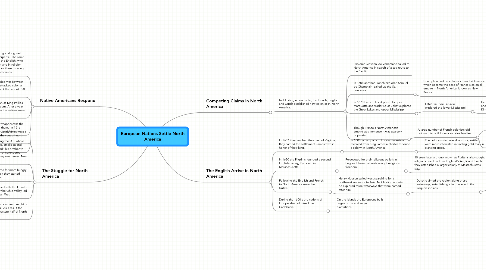
1. Native Americans Respond
1.1. The Dutch and French got along well with the native counterparts. The same could not be same of the English, who contstantly took more land in religion disputes and in need for there growing population and tobacco fields.
1.2. As early as 1622 there is recorded war between the two. The Powhatan tribe attacked colonial villages around Jamestwon and killed about 350 settlers.
1.3. One of the bloodiest conflicts was known as King Phillps war. It began in 1675 when Chief Metacom. After a year of harsh fighting and hundreds of deaths the natives were defeated.
1.4. Worse then the Englishes weapons was the disease they brought with them. In 1616 smallpox ravaged New England tribes.
1.5. In a matter of years all along the U.S. whole tribes would fall to measles, smallpox and other diseases.
2. The Stuggle for North America
2.1. The English felt that the Dutch lands were a strategic problem since they cut off north and south colonies.
2.2. In 1664 Charles ll gave the duke of york, his brother to take the land from the Dutch. The Dutch surendered without firing a shot and the new colony was named New York.
2.3. When the English became for more hungry after uprooting the Dutch they started pushing west in America.
2.4. By doing so they collided with the French. In 1754 a dispute over the Ohio Valley led to the French and Indian War.
2.5. In 1763 the French lost to the combined might of the British army and colonists. As a result the British controlled the whole eastern half of North America.
3. Competing Claims in North America
3.1. Not finding a new route, the French, English and Dutch established new colonies in North America.
3.1.1. Explorer Giovanni de Verrazzano sailed to North America in search of a sea route to the Pacific.
3.1.2. In 1608 another French explorer, Samuel de Champlain, sailed up the St. Lawrence.
3.1.2.1. Champlain and his colonists founded Quebec which became the base of France's colonial empire in North America, known as New France.
3.1.3. In 1673 French Jesuit priest Jacques Marquette and trader Louis Joliet explored the Great Lakes and upper Mississippi.
3.1.3.1. Later Sieur de La Salle explored the lower Mississippi.
3.1.3.1.1. He claimed the entire river valley for France and named Louisiana in honor of the French King Louis XIV.
3.1.4. Though France's North American empire was immense it was sparsely populated.
3.1.4.1. A large number of French colonists did not want to build towns or raise families.
3.1.4.1.1. Many settlers were Catholic priests who saught to convert Native Americans.
3.1.4.1.2. Settlers also included young single men engaged in what had become New France's main economic activity, fur trade.
4. The English Arrive in North America
4.1. In 1607 they reached the coast of Virginia, they named the settlement Jamestown in honor of their king.
4.1.1. In 1606, a company of London investors received from King James a charter to found a colony in North America.
4.1.1.1. The colony's start was disastrous, settlers were more interested in finding gold than in planting crops.
4.1.1.1.1. During the first few years seven out of every ten people died of hunger, disease or battles with the Native Americans.
4.2. In 1620 the Pilgrims founded a second English colony, Plymouth in Massachusetts.
4.2.1. Persecuted for their religious beliefs in England these colonists sought religious freedom.
4.2.1.1. 10 years later a group known as Puritans also sought religious freedom from England's Anglican Church, they established a larger colony at Massachusetts Bay.
4.2.1.1.1. The Puritans wanted to build a model community that would set an example for other Christians to follow.
4.3. Following the English and French to North America were the Dutch.
4.3.1. Henry Hudson sailed west searching for a northwest sea route to Asia. Not finding a route he explored three waterways that were named after him.
4.3.1.1. Dutch claimed the region along these waterways, establishing a fur trade with the Iroquois indians.
4.3.1.1.1. Dutch merchants formed the Dutch West India Company.
4.4. During the 1600's the nations of Europe also colonized the Caribbean.
4.4.1. On the islands the Europeans built huge cotton and sugar plantations.
